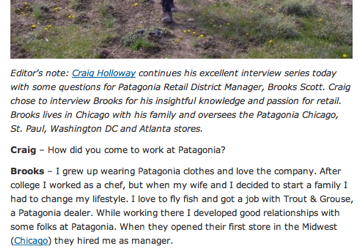 If you’re reading this, you likely understand the importance of good content. You know the formula: valuable content = influence = social reach = traffic = more reach… and so on. But do you know the secret to great content?
If you’re reading this, you likely understand the importance of good content. You know the formula: valuable content = influence = social reach = traffic = more reach… and so on. But do you know the secret to great content?
As marketers, we often look for the next big tool to differentiate ourselves. But did you know the most powerful content-creative tool was invented long before social media? It doesn’t involve keeping a Kodak Zi8 in your pocket, either. And you don’t need a fancy new Twitter strategy or some snazzy FBML.
The most powerful content tool is also the oldest. It’s the tool that brought us some of the most compelling moments in history—from fallen leaders to pop-culture confessions. It’s the tool that made Oprah arguably one of the most powerful brands on the planet. And the same one that Barbara Walters used to reach the most influential people of our time.
Your Content Advantage: The Interview
Yes, the interview. Powerful interviews create timeless content. Yet when it comes to blogging, we neglect to use our most powerful weapons. Master blog interview tactics and your content will surely make an impact—in any situation.

Famous rocker Glenn Danzig once said, “unfortunately, I have to say, one out of every 100 interviews I do, I get a real journalist.” So whether you write for yourself, your boss, a client or an industry analyst, leave the impression of a professional. Blog interviewing is a must-learn tactic.
Interviews can be recrafted into unique blog posts. The trick is asking the right questions.
Here are 11 lines of questioning you can use to extract great material:
#1: Informational Post
Q: What are the three biggest benefits to your target audience and why?
Many writers mistakenly focus on whiz-bang features, measures or accomplishments, but readers often have difficulty relating to these. By focusing on benefits, you push the interview subject to think outside of features and bells and whistles. Benefits are far more persuasive than features, and they are well-received by a larger audience.
#2: The Numbered List
Q: What are the [insert #] top questions asked by your [customers, readers, followers]? What are [#] more?
By using a two-part question, you force the subject to rank the priority of each item—space is limited. The second part of the question allows you to open it up, but you’ll know the items that really matter in your subject’s mind. Prioritized lists are important because many readers judge the value of your post by the first few items.

#3: The Mini Case Study
Q: Tell me about a day in your life—before and after the solution you chose.
By asking the subject to speak about his or her life, in personal rather than business terms, you’ll better extract how quality of life or work was improved. This leads to deeper and more unique follow-up questions and a strong emotional connection to your audience.

Discover Proven Marketing Strategies and Tips
Want to go even deeper with your marketing? Check out the Social Media Marketing Podcast! Publishing weekly since 2012, the Social Media Marketing Podcast helps you navigate the constantly changing marketing jungle, with expert interviews from marketing pros.
But don’t let the name fool you. This show is about a lot more than just social media marketing. With over 600 episodes and millions of downloads each year, this show has been a trusted source for marketers for well over a decade.

#4: Link or Resource Round-Ups
Q: If you had a list of ‘best-kept secrets’ [websites, books, coaches] you’d recommend, which would you include and why?
Get World-Class Marketing Training — All Year Long!
Are you facing doubt, uncertainty, or overwhelm? The Social Media Marketing Society can help.
Each month, you’ll receive training from trusted marketing experts, covering everything from AI to organic social marketing. When you join, you’ll also get immediate access to:
- A library of 100+ marketing trainings
- A community of like-minded marketers
- Monthly online community meetups
- Relevant news and trends updates
By asking for resources outside the mainstream, you’re likely to get a round-up that’s far more unique than other round-up blogs that mention the same mainstream thing.
#5: Expert Guide
Q: What tips can you recommend that you’d only share with a close friend (and everyone reading this blog)?
This line of questioning will force the subject to think outside the box. The subject benefits because he or she becomes even more of an expert, while your readers will be all but guaranteed unique content.
#6: Common Pitfalls or Problems
Q: What are three hard-to-spot pitfalls that are critical to avoid?
Even people who have moderate knowledge of a topic know about obvious pitfalls. Focusing on the most difficult hurdles to spot will make you a hero in the eyes of the people you save.
#7: Predictions or Trends
Q: Looking out 3 to 5 years, beyond the obvious trends, what do you think will be the next big change in your industry?
If you focus more than a year or two in the future, you’ll push your subject to stay away from the obvious. Example: If you’re a marketer, you don’t get much value from your subject telling you that social media will be huge next year.

#8: Response to Another Blog or Current Event
Q: When you first read that [article, blog post, comic, etc.], what was your gut reaction
This phrasing gives the subject psychological permission to tell you his or her honest opinion and not necessarily the prepared one.
#9: Inspirational Post or Client Story
Q: What are three things you’ve told yourself that kept you going during your darkest hour?
This question immediately turns the interview subject from an interviewee into a coach and sage. You’ll be surprised at how this single powerful question can literally transform an entire interview.

#10: Personal Profile or Biographical Q&A
Q: What are three life memories you recall most frequently and why?
The memories we recall most are often the ones that have had the biggest impact on our lives. You’ll likely learn a lot about your subject by following this line of questioning.

#11: Product, Service or Book Review
Q: What was the most difficult thing you decided to exclude from this review and what was your reasoning?
This question opens the interview subject up to a discussion about some of the things that may have been important but were not included for a variety of reasons. External factors like time, space, politics or other issues often don’t let reviewers include everything they’d like.
These eleven questions can help you craft great content for your blog. By interviewing, you’ll generate content that gives you tremendous reach.
I’d like to hear from you. What other lines of questioning have you used to enhance your blogging? Feel free to add your own in the comments below.
Attention Agency Owners, Brand Marketers, and Consultants

Introducing the Marketing Agency Show–our newest podcast designed to explore the struggles of agency marketers.
Join show host and agency owner, Brooke Sellas, as she interviews agency marketers and digs deep into their biggest challenges. Explore topics like navigating rough economic times, leveraging AI, service diversification, client acquisition, and much more.
Just pull up your favorite podcast app, search for Marketing Agency Show and start listening. Or click the button below for more information.

